Module 1 Explorations and exchanges Unit2 Culture shock Reading 课件(共24张PPT)
文档属性
| 名称 | Module 1 Explorations and exchanges Unit2 Culture shock Reading 课件(共24张PPT) |  | |
| 格式 | zip | ||
| 文件大小 | 9.7MB | ||
| 资源类型 | 教案 | ||
| 版本资源 | 牛津深圳版 | ||
| 科目 | 英语 | ||
| 更新时间 | 2019-08-19 07:49:21 | ||
图片预览

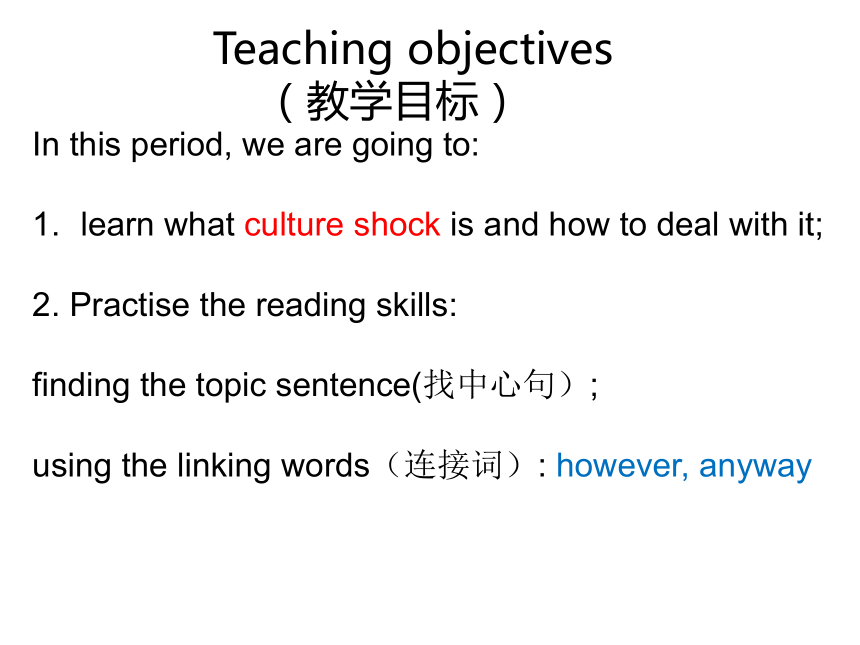
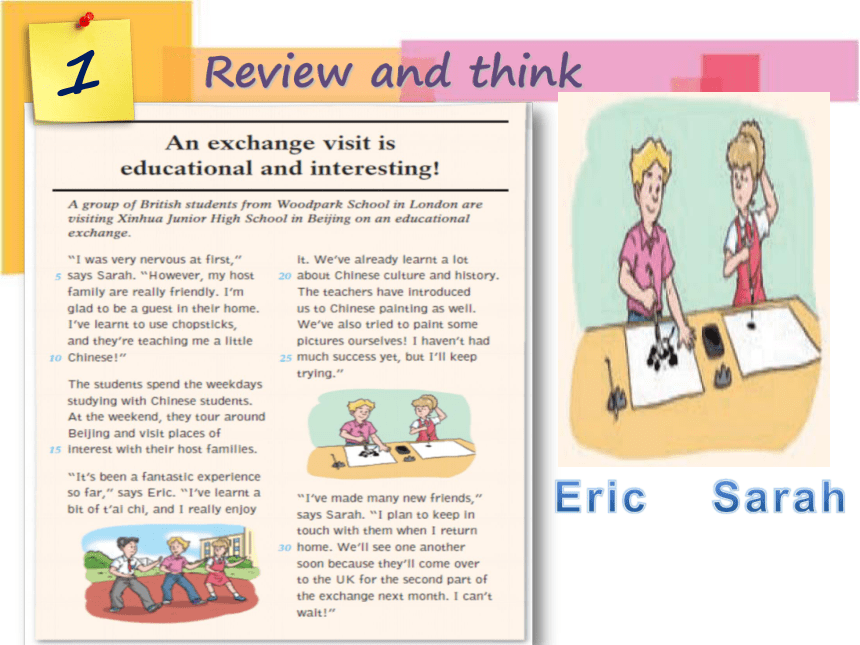

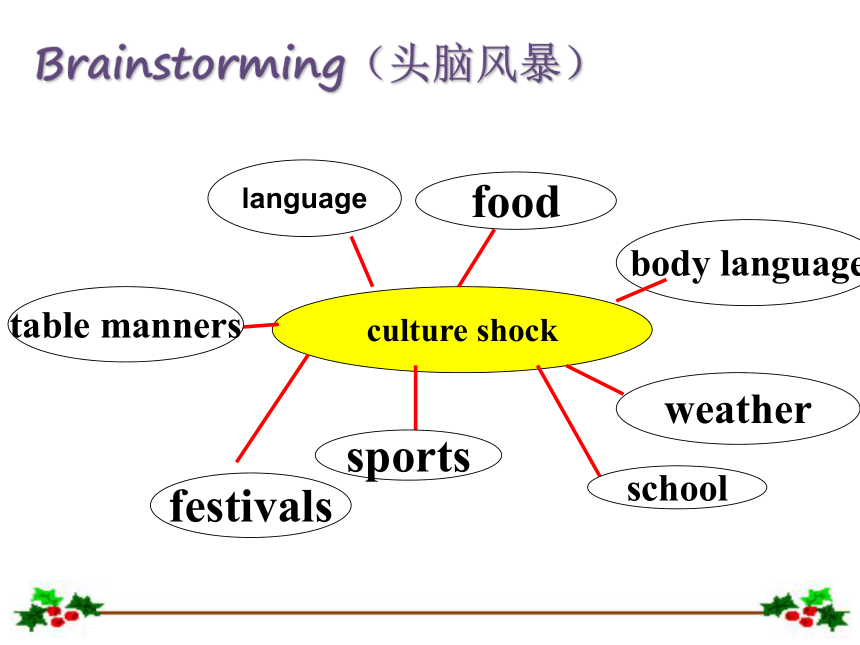
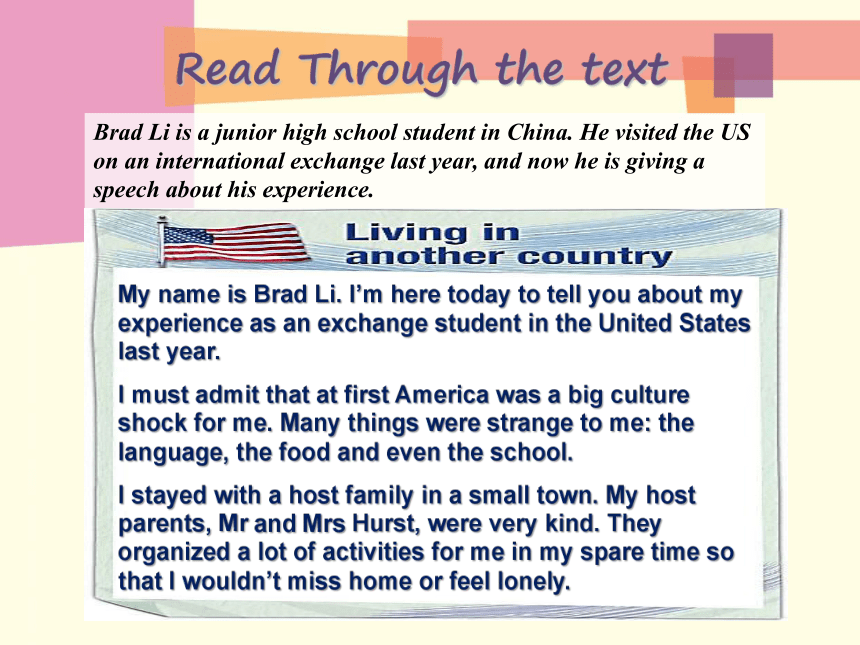
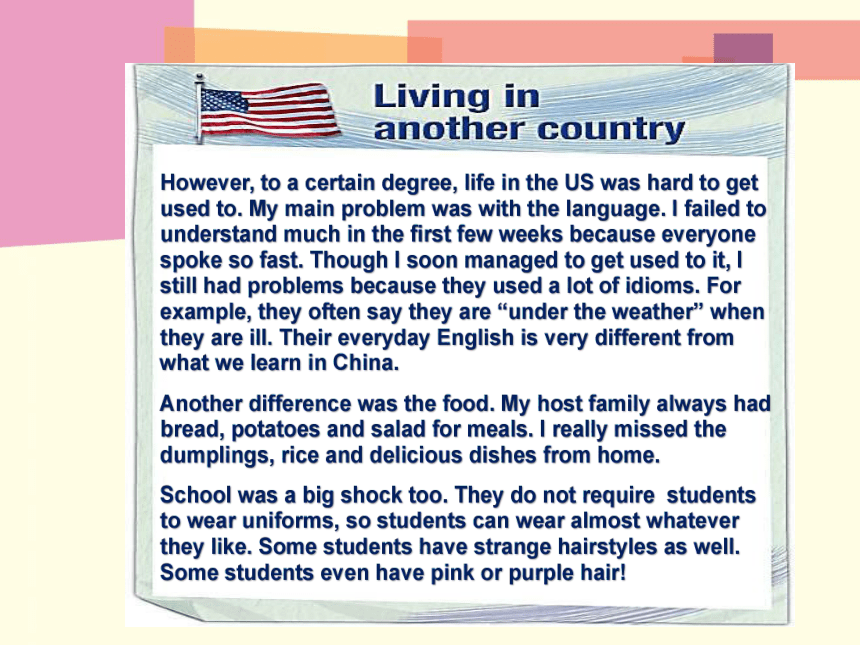
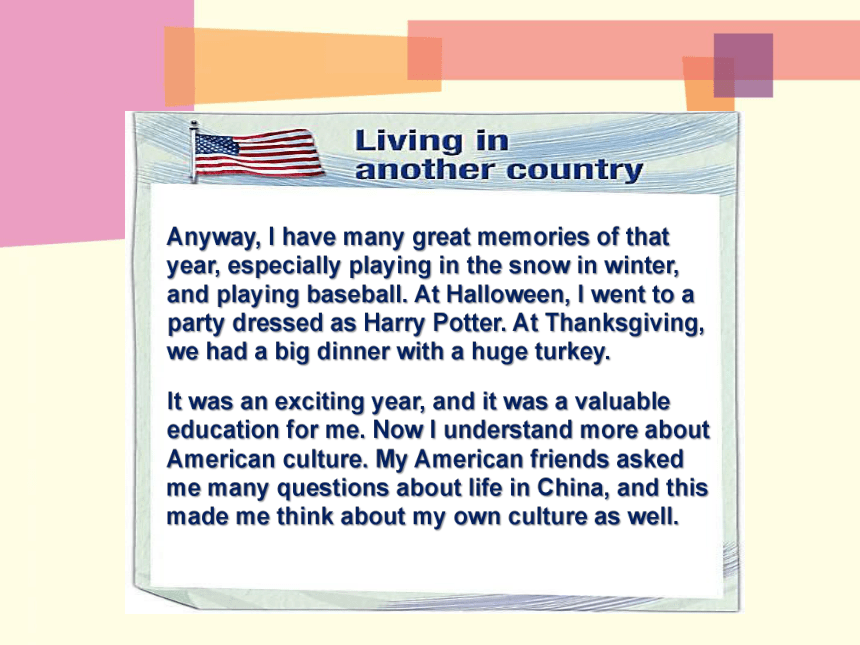
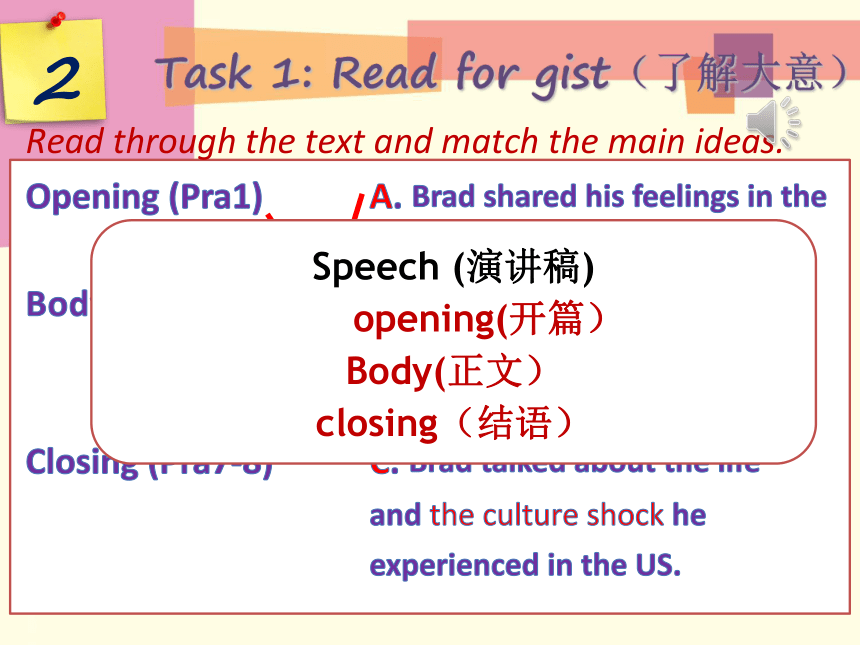
文档简介
(共24张PPT)
*
9B Unit 2 Culture Shock (Reading I)
Teaching objectives
(教学目标)
In this period, we are going to:
learn what culture shock is and how to deal with it;
2. Practise the reading skills:
finding the topic sentence(找中心句);
using the linking words(连接词): however, anyway
1
Review and think
1. What do they think of their exchange visit?
2. If you live in another country, What problems will you have?
Culture shock
culture shock
language
food
body language
weather
sports
festivals
school
table manners
Brainstorming(头脑风暴)
Read Through the text
My name is Brad Li. I’m here today to tell you about my experience as an exchange student in the United States last year.
I must admit that at first America was a big culture shock for me. Many things were strange to me: the language, the food and even the school.
I stayed with a host family in a small town. My host parents, Mr and Mrs Hurst, were very kind. They organized a lot of activities for me in my spare time so that I wouldn’t miss home or feel lonely.
Brad Li is a junior high school student in China. He visited the US on an international exchange last year, and now he is giving a speech about his experience.
However, to a certain degree, life in the US was hard to get used to. My main problem was with the language. I failed to understand much in the first few weeks because everyone spoke so fast. Though I soon managed to get used to it, I still had problems because they used a lot of idioms. For example, they often say they are “under the weather” when they are ill. Their everyday English is very different from what we learn in China.
Another difference was the food. My host family always had bread, potatoes and salad for meals. I really missed the dumplings, rice and delicious dishes from home.
School was a big shock too. They do not require students to wear uniforms, so students can wear almost whatever they like. Some students have strange hairstyles as well. Some students even have pink or purple hair!
Anyway, I have many great memories of that year, especially playing in the snow in winter, and playing baseball. At Halloween, I went to a party dressed as Harry Potter. At Thanksgiving, we had a big dinner with a huge turkey.
It was an exciting year, and it was a valuable education for me. Now I understand more about American culture. My American friends asked me many questions about life in China, and this made me think about my own culture as well.
Task 1: Read for gist(了解大意)
2
Speech (演讲稿)
opening(开篇)
Body(正文)
closing(结语)
I must admit that at first America was a big culture shock for me. Many things were strange to me: the language, the food and even the school.
Task 2: Scanning(扫读)
3
Read Paragraph 2 and complete the following diagram.
Main idea
Brad experienced _____________
last year.
Supporting
detail 1
______________
Supporting
detail 2
______________
Supporting
detail 3
____________
Read paragraph 2 and complete the following diagram.
Read Paragraph 3 and answer the questions.
What did Brad think of his host parents?
Why did his host parents organize a lot of
activities?
3. Did this make Brad’s life easy in the US?
Task 3: Inferring (推理)
However, to a certain degree, life in the US was hard to get used to. My main problem was with the language. I failed to understand much in the first few weeks because everyone spoke so fast. Though I soon managed to get used to it, I still had problems because they used a lot of idioms. For example, they often say they are “under the weather” when they are ill. Their everyday English is very different from what we learn in China.
Another difference was the food. My host family always had bread, potatoes and salad for meals. I really missed the dumplings, rice and delicious dishes from home.
School was a big shock too. They do not require students to wear uniforms, so students can wear almost whatever they like. Some students have strange hairstyles as well. Some students even have pink or purple hair!
Task 4: Finding the topic sentence(找中心句)
Read Paragraph 4 and complete the diagram.
Everyone spoke so fast
People in the US used a lot of idioms.
Their everyday English is very different from what we learn in China.
Cause 1 Cause 2 Cause 3
My main problem was with the language.
Effect
Task 5: Analyzing(分析)
bread, potatoes and salad
dumplings, rice and delicious dishes
can wear almost whatever they like
have strange hairstyles
even have pink or purple hair
have to wear uniforms at school
Task 7: Contrasting(对比)
short
not allowed
In the US In China
Food People have ________________
____________________. People have___________
___________________.
School Students ________________
___________________.
Some students ___________
. and some students ________________
_______________.
Students ____________
__________________.
Boy students should have ________ hair.
Girl students are ___________( allow) to dye(染色)their hair.
Chinese students
American students
What is the difference between Americans and Chinese in value (价值观)?
Chinese
Americans
individuality(个性)
unity (共性)
freedom (自由)
discipline (纪律)
Summary 1
4
Brad Li visited the United States last year as an exchange
student. America was a big______ _______for him at
first. The American’s everyday English was very_______
_____what he learnt in China. The _______was another
shock. And American students are not required to _____
________. Some of them even have ______ ______ as
well.
Anyway, Brad had many ______ _________ of his visit.
He stayed with a kind _____________ in a small town.
His host parents organized ________ _________ in his
spare time so that he would not miss home or ______
_______. It was an exciting experience and it’s a ______ ______ for him.
Reading skill 1(阅读技巧1):找中心句
Reading skill 2 (阅读技巧2):找连接词
so that , however, anyway
Writing skill(写作技巧):提论点,列论据
Work in groups of 6. Each student should take part in it.
Task 9: Group Discussion (讨论)
Each group will get a problem and you have to talk about your problems and discuss how to deal with them.
Speaker 1: explain your problem
Speaker 2: give your suggestions
culture shock
language
food
body language
weather
sports
festivals
school
table manners
Brainstorming(头脑风暴)
How to deal with culture shock
Task 10: Show time
6
Speaker 1:My name is Brad.
My main problem was with_____________.
That’s because…
For example,…
Speaker 2:My name is …
I’m happy to help you.
My advice is to….
I think you can….
7
Watch a video
Tips on dealing with culture shock:
Try and make new friends;
Learn about the culture before hand;
Share your own culture;
Don’t be afraid to ask questions;
Talk to your parents and friends;
Keep an open mind.
H
Homework
金牌作业:假如你是外教Patrick,写一篇作文: Living in China as a foreigner
银牌作业:给Brad 写一封回信,提出建议:
A letter to Brad
3.铜牌作业:
课文总结:将课文内容画成思维导图
*
9B Unit 2 Culture Shock (Reading I)
Teaching objectives
(教学目标)
In this period, we are going to:
learn what culture shock is and how to deal with it;
2. Practise the reading skills:
finding the topic sentence(找中心句);
using the linking words(连接词): however, anyway
1
Review and think
1. What do they think of their exchange visit?
2. If you live in another country, What problems will you have?
Culture shock
culture shock
language
food
body language
weather
sports
festivals
school
table manners
Brainstorming(头脑风暴)
Read Through the text
My name is Brad Li. I’m here today to tell you about my experience as an exchange student in the United States last year.
I must admit that at first America was a big culture shock for me. Many things were strange to me: the language, the food and even the school.
I stayed with a host family in a small town. My host parents, Mr and Mrs Hurst, were very kind. They organized a lot of activities for me in my spare time so that I wouldn’t miss home or feel lonely.
Brad Li is a junior high school student in China. He visited the US on an international exchange last year, and now he is giving a speech about his experience.
However, to a certain degree, life in the US was hard to get used to. My main problem was with the language. I failed to understand much in the first few weeks because everyone spoke so fast. Though I soon managed to get used to it, I still had problems because they used a lot of idioms. For example, they often say they are “under the weather” when they are ill. Their everyday English is very different from what we learn in China.
Another difference was the food. My host family always had bread, potatoes and salad for meals. I really missed the dumplings, rice and delicious dishes from home.
School was a big shock too. They do not require students to wear uniforms, so students can wear almost whatever they like. Some students have strange hairstyles as well. Some students even have pink or purple hair!
Anyway, I have many great memories of that year, especially playing in the snow in winter, and playing baseball. At Halloween, I went to a party dressed as Harry Potter. At Thanksgiving, we had a big dinner with a huge turkey.
It was an exciting year, and it was a valuable education for me. Now I understand more about American culture. My American friends asked me many questions about life in China, and this made me think about my own culture as well.
Task 1: Read for gist(了解大意)
2
Speech (演讲稿)
opening(开篇)
Body(正文)
closing(结语)
I must admit that at first America was a big culture shock for me. Many things were strange to me: the language, the food and even the school.
Task 2: Scanning(扫读)
3
Read Paragraph 2 and complete the following diagram.
Main idea
Brad experienced _____________
last year.
Supporting
detail 1
______________
Supporting
detail 2
______________
Supporting
detail 3
____________
Read paragraph 2 and complete the following diagram.
Read Paragraph 3 and answer the questions.
What did Brad think of his host parents?
Why did his host parents organize a lot of
activities?
3. Did this make Brad’s life easy in the US?
Task 3: Inferring (推理)
However, to a certain degree, life in the US was hard to get used to. My main problem was with the language. I failed to understand much in the first few weeks because everyone spoke so fast. Though I soon managed to get used to it, I still had problems because they used a lot of idioms. For example, they often say they are “under the weather” when they are ill. Their everyday English is very different from what we learn in China.
Another difference was the food. My host family always had bread, potatoes and salad for meals. I really missed the dumplings, rice and delicious dishes from home.
School was a big shock too. They do not require students to wear uniforms, so students can wear almost whatever they like. Some students have strange hairstyles as well. Some students even have pink or purple hair!
Task 4: Finding the topic sentence(找中心句)
Read Paragraph 4 and complete the diagram.
Everyone spoke so fast
People in the US used a lot of idioms.
Their everyday English is very different from what we learn in China.
Cause 1 Cause 2 Cause 3
My main problem was with the language.
Effect
Task 5: Analyzing(分析)
bread, potatoes and salad
dumplings, rice and delicious dishes
can wear almost whatever they like
have strange hairstyles
even have pink or purple hair
have to wear uniforms at school
Task 7: Contrasting(对比)
short
not allowed
In the US In China
Food People have ________________
____________________. People have___________
___________________.
School Students ________________
___________________.
Some students ___________
. and some students ________________
_______________.
Students ____________
__________________.
Boy students should have ________ hair.
Girl students are ___________( allow) to dye(染色)their hair.
Chinese students
American students
What is the difference between Americans and Chinese in value (价值观)?
Chinese
Americans
individuality(个性)
unity (共性)
freedom (自由)
discipline (纪律)
Summary 1
4
Brad Li visited the United States last year as an exchange
student. America was a big______ _______for him at
first. The American’s everyday English was very_______
_____what he learnt in China. The _______was another
shock. And American students are not required to _____
________. Some of them even have ______ ______ as
well.
Anyway, Brad had many ______ _________ of his visit.
He stayed with a kind _____________ in a small town.
His host parents organized ________ _________ in his
spare time so that he would not miss home or ______
_______. It was an exciting experience and it’s a ______ ______ for him.
Reading skill 1(阅读技巧1):找中心句
Reading skill 2 (阅读技巧2):找连接词
so that , however, anyway
Writing skill(写作技巧):提论点,列论据
Work in groups of 6. Each student should take part in it.
Task 9: Group Discussion (讨论)
Each group will get a problem and you have to talk about your problems and discuss how to deal with them.
Speaker 1: explain your problem
Speaker 2: give your suggestions
culture shock
language
food
body language
weather
sports
festivals
school
table manners
Brainstorming(头脑风暴)
How to deal with culture shock
Task 10: Show time
6
Speaker 1:My name is Brad.
My main problem was with_____________.
That’s because…
For example,…
Speaker 2:My name is …
I’m happy to help you.
My advice is to….
I think you can….
7
Watch a video
Tips on dealing with culture shock:
Try and make new friends;
Learn about the culture before hand;
Share your own culture;
Don’t be afraid to ask questions;
Talk to your parents and friends;
Keep an open mind.
H
Homework
金牌作业:假如你是外教Patrick,写一篇作文: Living in China as a foreigner
银牌作业:给Brad 写一封回信,提出建议:
A letter to Brad
3.铜牌作业:
课文总结:将课文内容画成思维导图
